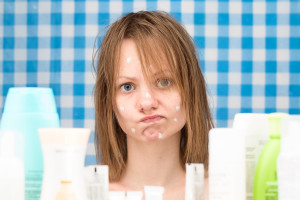Adult Acne. What Gives?
Most women would say that they were happy to leave their teenage years behind them, especially the friendship dramas, the pre-cell phone lifestyle, the bad hairstyle choices (remember temporary perms?), and especially the teenage acne. Some women, however, don’t get to leave the stress and anxiety of a bad complexion in their high school lockers. Data shows that 35 percent of women in their thirties, 26 percent of women in their forties, and 15 percent of women age 50 and older are still battling the acne breakouts often thought of as only plaguing teens and tweens. If you are among those women living under layers of concealer to hide adult acne, know that there are ways to clear your complexion that don’t involve photo filters.
What Causes Adult Acne?
Hormonal Changes
Think hormones only happen when you’re 16? Think again. Anytime your body increases its production of testosterone, it also increases its production of the oils that clog pores and lead to pimples. According to one study, women over age 33 are more likely to experience premenstrual pimples than younger women. The hormonal changes experienced during menopause can also result in an increase in acne.
Stress
As if it’s not already difficult enough to manage stress in your life, high levels of cortisol that are triggered by periods of stress can trigger acne in return. You know what that means. Stress + acne = Stress = more acne. A frustrating cycle.
A High Sugar Diet
A diet high in sugar can complicate a myriad of health issues, and acne is one of them. A high level of simple carbs and sugars, such as pastas, breads, and sugary desserts, can provoke a breakout in already problematic skin.
Dairy Products
Some studies have also shown a link between adult acne and dairy products. It’s believed that dairy-triggered acne break-outs are caused by the hormones present in some products.
Reduce Sodium Intake
Sodium is another food thought to trigger acne outbreaks. Some doctors believe the iodine frequently found in table salt may exacerbate acne breakouts.
Polycystic Ovarian Syndrome (PCOS)
PCOS is a hormonal disorder that impacts five to 10 percent of women. It causes enlarged ovaries with small cysts on the outer edges. If your adult acne is accompanied by other, more severe side effects of imbalanced hormones, such as excessive hair growth or irregular periods, talk to your OBGYN.
Treating Adult Acne
The best way to treat your adult acne will depend on its underlying cause, however what follows is a list of trusted acne-prevention tips:
- Decrease your overall consumption of refined carbohydrates and sugars. Too much sugar can spike the hormone levels that trigger outbreaks.
- Reduce overall dairy consumption. Some believe that fat free milk in particular, which has more sugar that higher fat versions, may be more likely to trigger an outbreak than other types of dairy products.
- Choose low-sodium food products. Keep your overall sodium consumption below 1,500 mg per day by choosing low-sodium varieties of prepackaged foods.
- Talk to your OBGYN about birth control pills. Depending on your family plan, birth control pills may be an effective way to help normalize the hormonal surges associated with your monthly cycle that can wreak havoc on your oil glands
- Consider blue light therapy. Blue light therapy is a treatment that uses light rays to penetrate follicles and kill acne-causing bacteria. If your acne is severe, your doctor may recommend photodynamic therapy, which adds a topic solution to a traditional blue light therapy treatment.
- Choose tea tree oil over benzoyl peroxide to treat pimples. Benzoyl peroxide can be drying, especially on adult skin. Tea tree oil has natural antiseptic properties to help treat mild to moderate acne outbreaks.
- Manage your stress. Exercise regularly, make sure you’re getting enough sleep each night, and balance your commitments and priorities to make sure you don’t fall victim to the skim complications that stress can cause.
- Choose topical skin care products that include antibacterials and retinoids. Retinoids are particularly important for adult women, since retinoids stimulate collagen production, which helps to fight acne. If OTC products aren’t doing enough to clear your complexion, talk to your dermatologist.
With a healthy diet, a strategy for managing stress, and a commitment to a face cleansing routine, you don’t have to feel like you are back in high school. Instead, you can keep your face pimple-free, smooth, and radiant. Now let’s talk about those high school prom dresses you’ve been thinking you may want to wear again.
More
